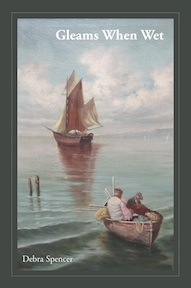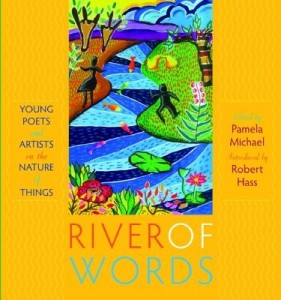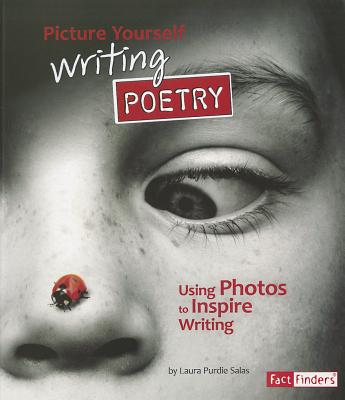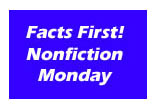I’m struggling to write a poetic picture book. To fill me with the metaphor, imagery, rhythm and meter that I’m striving for, I’ve been reading other books of poetry. Two interesting things happened during today’s readings…

First, I was reading Gleams When Wet by Debra Spencer. I had picked it up at Half Price Books on a whim, since I’m mostly searching for ideas that have to do with water. Interestingly, it’s mostly set in the Monterey/Santa Cruz, California, area, which is where my oldest child is currently studying marine biology, so that was a fun connection. There are some beautiful and intriguing poems in here, as well as insightful commentary on life. It made for quite an enjoyable afternoon. (Yes, sitting and reading poetry all afternoon is sometimes actually my job. How lucky am I!?) What particularly struck me, however, is the inscription from the author (“To XXX, another adventurous father, with love from Debra”) and the handwritten card still tucked inside: “Happy birthday, XXX — I think you’ll enjoy this. Her poems are wonderful! See page 54! I also love Old Sailor’s Manifesto (p. 34) — and many others. Enjoy! Love, Mom” (*Note: Name changed to XXX to protect the innocent. 😉)
When I first read these words, I was instantly saddened. His mom had poured so much love into this thoughtful gift (not to mention it was personalized by the author)! How could he have given it away to end up on the shelf at my local HPB? But then I thought, selfishly, how lucky I was that he did, else I would never have happened upon it in my random HPB treasure hunt! Then I thought, maybe he read them and they just didn’t connect. It’s kind of sad that Mom missed the mark, but hey, it happens. Hopefully, he appreciated the thought, at least. Or maybe he read them and loved them, taking pictures of or typing up his favorites to file them away digitally rather than cluttering up his physical space. In the end, I’ve decided, it doesn’t matter why he didn’t treasure it. The real gift was in the giving. No matter what XXX felt about the gift or his reasons for passing it on, it warms my heart to think that his mom loved him, that she also loved words, and that she wanted to share them with him. As I struggle with my poetry project, I have often thought that perhaps it’s not worth it, perhaps it’s too far outside of my wheelhouse and I should stick to what I’m good at, perhaps no one will ever read or care about my words. Perhaps Debra thought that, too, before Mom came to get Gleams When Wet signed for her son. Perhaps, if I keep struggling, some other Mom will lovingly buy my poetic picture book for her child, and I’ll to get sign it, “To XXX, with love.”

Another book that struck me was River of Words, edited by Pamela Michael. It’s a collection of poems written by young people–many as young as 6 or 7–about the natural world. And. it. is. so. good! Not only did it do exactly what I was hoping for–filling my artist’s well with even more water images and metaphors to potentially use in my own project–but it was incredibly inspiring as well. Yes, these young writers are clearly very talented, but they are certainly not professional poets. Yet, their poems sing with meaning. The depths of what they are able to say with so few words reminds me why I’m trying to complete this project in the first place, to convey something that is deep and meaningful to me to young readers. And the success the poems achieve in conveying each individual author’s essence gives me hope that perhaps my poetry can one day make that kind of connection with readers, too.
So, thank you to the poets out there struggling to make your words and meaning flow. Thank you to publishers who still believe in creating beautiful poetry books for children and adults. And thank you to everyone who buys books to share with those you love. 💛
poetry
Review: Picture Yourself Writing Poetry

Picture Yourself Writing Poetry: Using Photos to Inspire Writing
by Laura Purdie Salas
Capstone Press, August 2011
32 pages
Ages: 8 and up
This title is one of the Picture Yourself Writing ____: Using Photos to Inspire Writing series, and it’s quite effective—it inspired me to write! Not only does it demonstrate how one can use images to get ideas for poems, it also contains many specific, easy-to-understand writing tips. Salas covers such important topics as incorporating sensory detail, choosing concrete nouns and strong verbs, characterization and point of view, and structure, all paired with wonderful examples.
The books opens up with the line, “The best poems are magical, miniature worlds.” It then shows readers how to create those worlds themselves while inviting them to enter several created by Salas.
I think this would be a great book to incorporate into any poetry curriculum. I would also heartily recommend it to students who enjoy writing… as well as to those who tend to struggle with it.

(Disclaimers: I received this copy for review for free from the publisher as part of the Cybils judging process. This review is my opinion only and doesn’t necessarily reflect the judging committee’s selections.)
